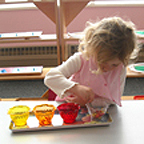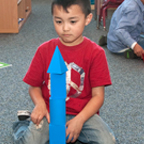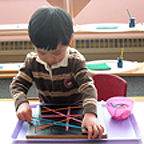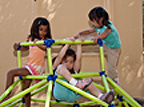Curriculum
Our curriculum gives children an opportunity to learn at their own pace and allows them to participate in programs designed especially for their abilities and interests. Each child experiences success and confidence through non-competitive activities. Dr. Maria Montessori stated, "Never let a child risk failure, until he has a reasonable amount of success." In other words, we strive to teach the children basic skills before using them in a competitive learning environment. The Montessori curriculum is divided into five major areas: Practical Life, Sensorial, Language, Math, Geography, and Science. A short introduction describing the Montessori curriculum follows:

This area consists of exercises that enhance the child's "care of self", eye-hand coordination, fine motors skills, and focus of attention. Practical Life tasks are realistic daily life chores focusing on developing control, independence, coordination and social graces.

The sensorial area develops and refines the child's senses. Children learn to recognize geometric shapes and colors. They also learn to sort and classify objects by size or purpose.
 Through songs, rhymes, hands on materials, and age appropriate activities, the children learn to recognize numerals and geometric shapes. They count by ones, backwards and forwards, and learn to associate the appropriate quantity to the correct numeral by studying number recognition and quantitative concepts. The children learn the concept of number sequencing by practicing counting skills everyday. Many children learn to count and recognize numbers to 100. The children are taught how to make responsible estimates (which group has more/less) and are taught comparison skills. Children practice the concepts of addition and subtraction with hands on activities. Learning the basics of math helps children to build a good foundation for developing higher math problem solving skills.
Through songs, rhymes, hands on materials, and age appropriate activities, the children learn to recognize numerals and geometric shapes. They count by ones, backwards and forwards, and learn to associate the appropriate quantity to the correct numeral by studying number recognition and quantitative concepts. The children learn the concept of number sequencing by practicing counting skills everyday. Many children learn to count and recognize numbers to 100. The children are taught how to make responsible estimates (which group has more/less) and are taught comparison skills. Children practice the concepts of addition and subtraction with hands on activities. Learning the basics of math helps children to build a good foundation for developing higher math problem solving skills.
 In the geography area, children acquaint themselves with their world by using globes and maps. They learn the names of the seven continents and about the landforms that make up our earth. In science class, the children learn to respect and care for the environment. Teachers use a hands-on approach to science learning and prepare interesting science experiments for circle time. The study of plants and tress, earth and the environment, magnets, the solar system, and animal lifestyles and habitats are some of the topics we discuss during science time. Science investigations help children learn to follow and complete directions, with each observation they do.
In the geography area, children acquaint themselves with their world by using globes and maps. They learn the names of the seven continents and about the landforms that make up our earth. In science class, the children learn to respect and care for the environment. Teachers use a hands-on approach to science learning and prepare interesting science experiments for circle time. The study of plants and tress, earth and the environment, magnets, the solar system, and animal lifestyles and habitats are some of the topics we discuss during science time. Science investigations help children learn to follow and complete directions, with each observation they do.
 Maria Montessori believed that writing precedes reading in a child's language development. Our language exercises help to develop the child's vocabulary and understanding of the English language through stories, poems and conversations. Phonics is taught at circle time to prepare the children for reading. Children learn the phonetic sounds of the alphabet through songs, rhymes, and by playing initial sound games where the beginning sounds in the words are isolated. Later on, the children listen for ending and middle sounds, eventually allowing them to blend three letter words together. Children proceed to reading short phrases, simple sentences, and phonetic readers. Little girl practicing writing Sight words are introduced as their reading skills increase. This early success in reading builds a child's self-confidence. Each child will improve his or her auditory and visual discrimination skills to ensure success in reading development. The children are taught beginning handwriting skills as their fine motor skills develop.
Maria Montessori believed that writing precedes reading in a child's language development. Our language exercises help to develop the child's vocabulary and understanding of the English language through stories, poems and conversations. Phonics is taught at circle time to prepare the children for reading. Children learn the phonetic sounds of the alphabet through songs, rhymes, and by playing initial sound games where the beginning sounds in the words are isolated. Later on, the children listen for ending and middle sounds, eventually allowing them to blend three letter words together. Children proceed to reading short phrases, simple sentences, and phonetic readers. Little girl practicing writing Sight words are introduced as their reading skills increase. This early success in reading builds a child's self-confidence. Each child will improve his or her auditory and visual discrimination skills to ensure success in reading development. The children are taught beginning handwriting skills as their fine motor skills develop.
 During the school year, we celebrate birthdays, holidays and special occasions making everyday special when shared with friends at school. Smiles, giggles, hugs and a positive environment help children develop their self-confidence and work to their fullest potential. Success is always achieved through individual praise and challenging instruction. Children will love learning, playing, and making many friends at Millbrae Montessori.
During the school year, we celebrate birthdays, holidays and special occasions making everyday special when shared with friends at school. Smiles, giggles, hugs and a positive environment help children develop their self-confidence and work to their fullest potential. Success is always achieved through individual praise and challenging instruction. Children will love learning, playing, and making many friends at Millbrae Montessori.
 We offer arts, crafts, and cooking activities to enhance the child's creativity. Children enjoy making special projects to take home and share with their families.
We offer arts, crafts, and cooking activities to enhance the child's creativity. Children enjoy making special projects to take home and share with their families.
We offer a fun and exciting Spanish program which teaches young children simple vocabulary words through music, songs, finger plays and games. The children look forward to their weekly lessons. The mood is festive and the music is happy. The children especially enjoy the songs, learning as they sing along with the teacher in Spanish and Mandarin.
A Montessori music class is offered once a week to all students. Music is taught by a certified music teacher. Our music class is designed to help develop each child's mind and body awareness through rhymes, songs, and dances, while incorporating musical instruments on many occasions. Singing creates a relaxed and happy atmosphere.
Organized field trips provide the children with an opportunity to learn outside the Montessori classroom. Field trips are tied into the current topic of study, expanding the child's overall education. During the school year, we offer planned workshops conducted by guest speakers on our school campus.
